Podcast
Questions and Answers
¿Cuál es el proceso mediante el cual los individuos con ciertos rasgos mejor adaptados a su entorno tienen más probabilidades de sobrevivir y reproducirse?
¿Cuál es el proceso mediante el cual los individuos con ciertos rasgos mejor adaptados a su entorno tienen más probabilidades de sobrevivir y reproducirse?
- Herencia genética
- Evolución artificial
- Selección natural (correct)
- Adaptación evolutiva
¿Cuál es el requisito clave para que la selección natural ocurra?
¿Cuál es el requisito clave para que la selección natural ocurra?
- Heritabilidad de los rasgos
- Todas las opciones anteriores (correct)
- Variación genética
- Diferencial de reproducción
¿Cuál es el tipo de adaptación evolutiva que implica un cambio en la función interna de un organismo?
¿Cuál es el tipo de adaptación evolutiva que implica un cambio en la función interna de un organismo?
- Adaptación fisiológica (correct)
- Adaptación estructural
- Adaptación por comportamiento
- Adaptación geográfica
¿Qué es un ejemplo de adaptación evolutiva?
¿Qué es un ejemplo de adaptación evolutiva?
¿Qué ocurre con los individuos con rasgos desventajosos en la selección natural?
¿Qué ocurre con los individuos con rasgos desventajosos en la selección natural?
¿Cuál es el resultado a largo plazo de la selección natural en una población?
¿Cuál es el resultado a largo plazo de la selección natural en una población?
¿Qué es el material fundamental para la evolución?
¿Qué es el material fundamental para la evolución?
¿Cuál es el resultado de la supervivencia y la reproducción de bacterias resistentes a antibióticos?
¿Cuál es el resultado de la supervivencia y la reproducción de bacterias resistentes a antibióticos?
¿Cuál es la importancia de la variación dentro de una especie?
¿Cuál es la importancia de la variación dentro de una especie?
¿Cuál es un tipo de variación dentro de una especie?
¿Cuál es un tipo de variación dentro de una especie?
¿Cuál es una causa de la variación dentro de una especie?
¿Cuál es una causa de la variación dentro de una especie?
Flashcards are hidden until you start studying
Study Notes
Natural Selection
- Definition: The process by which individuals with certain traits that are better suited to their environment are more likely to survive and reproduce, passing those traits on to their offspring.
- Key components:
- Variation: There must be genetic variation within a population.
- Heritability: The traits must be heritable, meaning they are passed down from parents to offspring.
- Differential reproduction: The environment affects the reproduction of individuals with different traits.
- Mechanisms:
- Survival: Individuals with advantageous traits are more likely to survive.
- Reproductive success: Individuals with advantageous traits are more likely to reproduce.
Evolutionary Adaptation
- Definition: The process by which a population becomes better suited to its environment over time.
- Types:
- Structural adaptation: A physical change in an organism, such as the development of wings.
- Behavioral adaptation: A change in behavior, such as migrating to a new habitat.
- Physiological adaptation: A change in the internal functions of an organism, such as the ability to regulate body temperature.
- Examples:
- Peppered moths: Prior to the Industrial Revolution, the moths had a light coloration, but with the increase in air pollution, a dark-colored morph became more common, as it was better camouflaged on dark-colored tree trunks.
- Antibiotic resistance: Bacteria that are resistant to antibiotics are more likely to survive and reproduce, passing on their resistance to their offspring.
Species Variation
- Definition: The differences between individuals within a species, which can lead to the formation of new species.
- Causes:
- Genetic drift: Random events, such as natural disasters or genetic mutations, that alter the gene pool.
- Gene flow: The movement of individuals with different genetic traits into a new population.
- Mutation: Changes in the DNA sequence of an individual.
- Types:
- Continuous variation: Traits that vary continuously, such as height or skin color.
- Discontinuous variation: Traits that fall into distinct categories, such as blood type.
- Importance:
- Species variation is the raw material for evolution, as it provides the genetic differences that can be acted upon by natural selection.
- It allows species to adapt to changing environments and survive in the face of challenges.
Studying That Suits You
Use AI to generate personalized quizzes and flashcards to suit your learning preferences.




